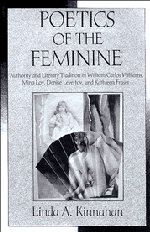 Poetics of the Feminine
Poetics of the Feminine Book contents
- Frontmatter
- Contents
- Acknowledgments
- Introduction
- 1 “The Full of My Freed Voice”: Williams and Loy, Feminism and the Feminine
- 2 In The American Grain: Proclaiming a Feminine Ground
- 3 Denise Levertov: The Daughter's Voice
- 4 Kathleen Fraser: A Tradition of Marginality
- Conclusion: Paterson and the Question of Authority
- Notes
- Bibliography
- Index
- CAMBRIDGE STUDIES IN AMERICAN LITERATURE AND CULTURE
3 - Denise Levertov: The Daughter's Voice
The Daughter's Voice
Published online by Cambridge University Press: 08 January 2010
- Frontmatter
- Contents
- Acknowledgments
- Introduction
- 1 “The Full of My Freed Voice”: Williams and Loy, Feminism and the Feminine
- 2 In The American Grain: Proclaiming a Feminine Ground
- 3 Denise Levertov: The Daughter's Voice
- 4 Kathleen Fraser: A Tradition of Marginality
- Conclusion: Paterson and the Question of Authority
- Notes
- Bibliography
- Index
- CAMBRIDGE STUDIES IN AMERICAN LITERATURE AND CULTURE
Summary
Well, I think Denise has a sense of metrical arrangement of lines which is not the conventional thing, but it has a unity.… I feel closer to her than to any of the modern poets. She is more alert – very much more alert to my feeling about words – As Flossie says, she is America's woman poet of the future.
– William Carlos WilliamsTo read the profuse writings of Denise Levertov is certainly to read within a Williams tradition; Levertov's critics and the poet herself have amply documented the influential presence Williams maintains in Levertov's lyrical affirmation of the ordinary, her adoption of an American idiom, and her understanding of form. Williams's enthusiasm for Levertov's work, as the opening quote suggests, grows in part from a recognition of a poetic heir who, in carrying on his own project, mirrors and affirms for the older poet his struggle to develop a distinctly American poetry. However, in an interesting moment of validation, Williams turns to Flossie for the authority to comment upon “America's woman poet,” distinguishing both his wife and his literary daughter from a mainstream, male American poetry. This moment is loaded with an unresolved ambiguity, for on the one hand it can be seen as a subtle slighting of “women's poetry.”
- Type
- Chapter
- Information
- Poetics of the FeminineAuthority and Literary Tradition in William Carlos Williams, Mina Loy, Denise Levertov, and Kathleen Fraser, pp. 125 - 182Publisher: Cambridge University PressPrint publication year: 1994
